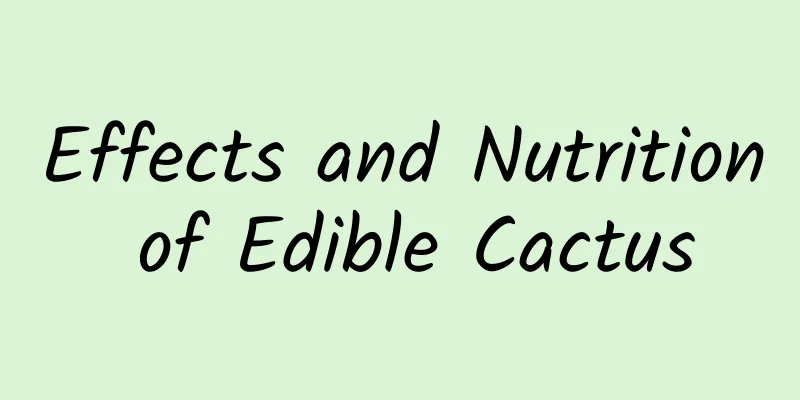How to eat pomegranate? The efficacy and function of pomegranate

|
Autumn is here, and it is the season when pomegranates are available in large quantities. Many people like to eat pomegranates. Pomegranates are not only cute in appearance, but also taste refreshing and sweet, which makes people love them. What are the effects and functions of pomegranates? Nutritional Value of PomegranatePomegranates are particularly rich in nutrients, containing a variety of nutrients needed by the human body. The fruit contains vitamin C and B vitamins, organic acids, sugars, proteins, fats, and minerals such as calcium, phosphorus, and potassium. According to analysis, pomegranates contain 17% carbohydrates, 79% water, and 13-17% sugar. The content of vitamin C is 1-2 times higher than that of apples, while the content of fat and protein is relatively low. The fruit is mainly eaten fresh. The efficacy and function of pomegranate1. Beautify your skin Pomegranates are rich in minerals and have two major antioxidant ingredients - pomegranate polyphenols and anthocyanins. They also contain linoleic acid, vitamins C, B6, E and folic acid. The mineral extracts such as calcium, magnesium and zinc contained in pomegranates can quickly replenish the skin's lost moisture, making the skin brighter and smoother. 2. Broad-spectrum antibacterial Pomegranate has obvious inhibitory effects on Shigella dysenteriae, Staphylococcus aureus, hemolytic Streptococcus, Vibrio cholerae, Shigella dysenteriae, etc. It also has inhibitory effects on various skin fungi to varying degrees. Pomegranate peel decoction can also inhibit influenza virus. 3. Prevent cardiovascular disease Pomegranates contain high levels of antioxidants, which can be used to resist inflammation and the destructive effects of oxygen free radicals in the human body, thereby delaying aging, preventing atherosclerosis and slowing down the process of cancer. The effect is even better than red wine. 4. Astringent and astringent Pomegranate tastes sour and contains alkaloids, ursolic acid, etc. It has obvious astringent effect, can astringe the intestines and stop bleeding. In addition, it has good antibacterial effect, so it is a good product for treating dysentery, diarrhea, bloody stool, spermatorrhea, rectal prolapse and other diseases. 5. Deworming and killing insects Pomegranate peel and pomegranate root bark both contain pomegranate alkaloids, which have an anesthetic effect on human parasites. They are important drugs for anthelmintics and insecticides, especially for tapeworms. They can be used to treat abdominal pain caused by worms, scabies, etc. 6. Stop bleeding and improve eyesight Pomegranate flowers are sour, astringent and flat in nature. If dried and ground into powder, they have a good hemostatic effect and can also stop leucorrhea. How to eat pomegranate1. Make pomegranate juice for drinking: Use a juicer to extract the pomegranate juice and drink a cup of it every day to protect the cardiovascular and cerebrovascular system. It is good for the elderly and even better for men. 2. Grind the residue in the juicer into powder. Eating a few bites every day is good for diabetics and can relieve their vision damage. 3. Make pomegranate vinegar: Put the pomegranate seeds in a glass bottle, pour in the brewed white vinegar until it covers the pomegranates, and then add rock sugar (depending on your taste). After three months, the pomegranate vinegar is ready for drinking. It is said that pomegranate vinegar is particularly rich in nutrients, containing a variety of nutrients needed by the human body. The fruit contains vitamin C and B vitamins, organic acids, sugars, proteins, fats, and minerals such as calcium, phosphorus, and potassium. Pomegranate vinegar contains carbohydrates and sugars, among which the content of vitamin C is particularly high, while the content of fat and protein is indeed relatively low. |
<<: What are the effects and functions of pomegranate? What are the benefits of eating pomegranate?
Recommend
How is Unreal Engine? Unreal Engine review and website information
What is Unreal Engine? Unreal Engine is a game eng...
How to eat milk melon? What are its nutritional values?
How to eat milk melon? What is its nutritional va...
The calories in cornmeal and the effects of cornmeal
Cornmeal contains a variety of nutrients, such as...
The efficacy and function of snow ginseng ointment
Snow ginseng ointment is a Chinese patent medicin...
What are the benefits of coconut oil? How to use coconut oil for skin care
When people eat coconuts, they usually crack them...
The efficacy and cultivation of Amaryllis
Amaryllis is a herbaceous plant of the Amaryllis ...
The health benefits of loofah and how to treat sinusitis with loofah
I heard that loofah has good health benefits, so ...
Steps for making fried chicken gizzards with hot peppers
Stir-fried chicken gizzards are my husband's ...
The difference between small and large persimmons and the benefits of eating persimmons
Small tomatoes and large tomatoes are both common...
Corn juice production method
Here are some common methods of making corn juice...
The efficacy and function of rice wine and the taboos of drinking rice wine
Huangjiu is a famous traditional Chinese wine, kn...
What is the Sex Museum like? Sex Museum reviews and website information
What is the Sex Museum website? The Sex Museum is ...
What are the Los Angeles Clippers like? Los Angeles Clippers reviews and website information
What is the Los Angeles Clippers website? The Los ...
How is Vietnam Investment and Development Bank? Vietnam Investment and Development Bank Reviews and Website Information
What is the website of Bank for Investment and Dev...
What is Need for Speed? Need for Speed review and website information
What is the Need for Speed website? Need for Spe...









